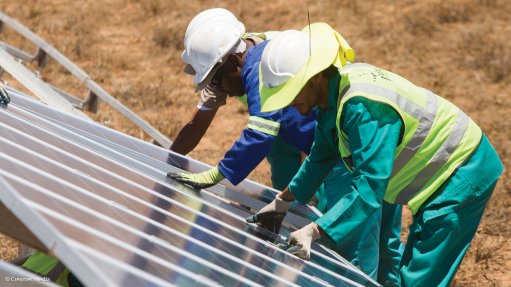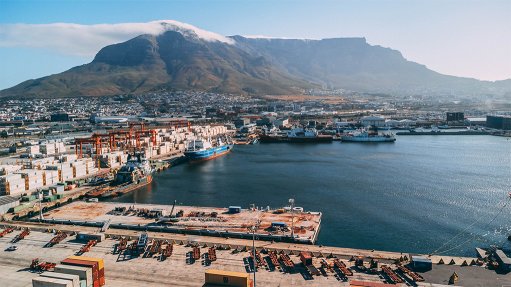African development enjoying greater support from Japan
Japan is giving increasing attention to assisting the development of African countries. “Historically speaking, our aid to East Asia and South- East Asia has occupied a fairly large proportion of our efforts,” explains Japan International Cooperation Agency (Jica) President Dr Akihiko Tanaka. (Jica is Japan’s international development organisation.) “But, since the TICAD (Tokyo International Conference on African Development) started, our efforts in Africa have been increasing.”
The first TICAD was held in 1993, and these conferences have been held every five years since. (The TICAD thus predates the European Union Africa Summit and the Forum of China Africa Cooperation, both started in 2000, and the India Africa Forum and the Korea Africa Forum, which were both initiated in 2006.) TICAD V is scheduled for the first week of June.
Today, each year, on average, African countries receive $400- million in grant aid, $400-million in technical cooperation and $800-million in concessionary loans from Japan. “When it comes to grant aid, about 40% of our total grant aid goes to Africa,” he reports.
There is no one-size-fits-all approach. “Of course, there is country specificity. Grant aid is normally given to countries whose financial situations are not conducive to receiving concessionary loans. Much of the grant aid is directed at infrastructure – ports, railways, power stations – and health and education too. With regard to education, we provide grant aid for building schools, teacher training facilities and vocational schools. And some of the grant aid is used to build hospitals. South Africa is not eligible for grant aid. Most Southern African countries are not eligible.”
Again, with technical cooperation, the programmes supported vary from country to country, depending on the particular needs of each. Jica does, however, attach importance to capacity development in industry, increasing agricultural productivity and increasing educational quality, especially in maths and the sciences. Agriculture is a particularly large area of cooperation. Another important sector is health, including the development of nurses and training in the management of hospitals.
“Concessionary loans have very low interest rates – as low as 0.1% interest, ten years grace period and 40-year repayment.” explains Tanaka. “Africa is receiving quite a large proportion of the concessionary loans. This is partly due to the stage of development and the need for infrastructure. Of course, you watch the [recipient] country’s condition.” These loans are generally intended to finance large-scale infrastructure development projects – similar to, but bigger than, those funded through grant aid.
In a recent address to a seminar hosted by the University of Pretoria in cooperation with Jica, the embassy of Japan and the South African Institute of International Affairs, Tanaka pointed out that, in the past five years, his agency had supported the training of 800 000 maths and science teachers and 220 000 health personnel in Africa. “In my view,” he affirmed, “the growth centre of the world’s economy is now beginning to shift from the Pacific to a broader region I call Indo-Pacific.” This term derives from, and refers to, the Indian and Pacific Oceans and the countries around and in them. “In the Indian Ocean, we find new economic powers emerging. Japan and South Africa are at the north and south ends of this vast region.The Japanese business community is focusing its eyes on Africa.” Japanese aid to Africa is based on four principles, he stated. These are inclusive development, energy production and supply, good governance and human security.
In his address to the seminar, Japanese ambassador to South Africa Yutaka Yoshizawa pointed out that his country had doubled its aid to Africa over the past five years – the total now came to $1.8-billion a year. Further, some 110 Japanese companies were operating in South Africa and had created about 150 000 jobs. Japan is South Africa’s third- biggest export market and fifth- biggest source of imports, with South Africa running a trade surplus (more than R6.3-billion last year).
TICAD V will be held from June 1 to 3 in Yokohama (not Tokyo) in Japan and will have three main themes. These are robust and sustainable economy, inclusive and resilient society and peace and stability. President Jacob Zuma is scheduled to attend on what will be his first trip to Japan.
Comments
Announcements
What's On
Subscribe to improve your user experience...
Option 1 (equivalent of R125 a month):
Receive a weekly copy of Creamer Media's Engineering News & Mining Weekly magazine
(print copy for those in South Africa and e-magazine for those outside of South Africa)
Receive daily email newsletters
Access to full search results
Access archive of magazine back copies
Access to Projects in Progress
Access to ONE Research Report of your choice in PDF format
Option 2 (equivalent of R375 a month):
All benefits from Option 1
PLUS
Access to Creamer Media's Research Channel Africa for ALL Research Reports, in PDF format, on various industrial and mining sectors
including Electricity; Water; Energy Transition; Hydrogen; Roads, Rail and Ports; Coal; Gold; Platinum; Battery Metals; etc.
Already a subscriber?
Forgotten your password?
Receive weekly copy of Creamer Media's Engineering News & Mining Weekly magazine (print copy for those in South Africa and e-magazine for those outside of South Africa)
➕
Recieve daily email newsletters
➕
Access to full search results
➕
Access archive of magazine back copies
➕
Access to Projects in Progress
➕
Access to ONE Research Report of your choice in PDF format
RESEARCH CHANNEL AFRICA
R4500 (equivalent of R375 a month)
SUBSCRIBEAll benefits from Option 1
➕
Access to Creamer Media's Research Channel Africa for ALL Research Reports on various industrial and mining sectors, in PDF format, including on:
Electricity
➕
Water
➕
Energy Transition
➕
Hydrogen
➕
Roads, Rail and Ports
➕
Coal
➕
Gold
➕
Platinum
➕
Battery Metals
➕
etc.
Receive all benefits from Option 1 or Option 2 delivered to numerous people at your company
➕
Multiple User names and Passwords for simultaneous log-ins
➕
Intranet integration access to all in your organisation


















